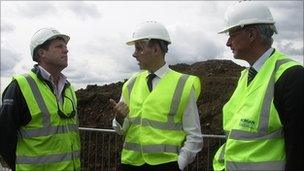Winding up the West Midlands Regional Development Agency
- Published

Advantage West Midlands is praised by some and criticised by others
With the Regional Development Agencies due to close in 2012, in the West Midlands and elsewhere, arguments continue about their value and their legacy.
The first thing you notice when arriving at the Advantage West Midlands (AWM) headquarters near the centre of Birmingham is how much space there is in the car park. This is what it means to be a quango on the way out.
Unwanted and unloved, Regional Development Agencies seemed to epitomise everything the coalition government felt had been wrong with public spending.
The RDAs were regularly criticised for being bloated, inefficient and too bureaucratic. In June when the government announced they would all be closed by 2012, the Taxpayer's Alliance said that they were an "unnecessary and expensive layer of bureaucracy that stifle genuine private enterprise".
Inside Advantage West Midlands staff remain at their desks. They all know they will be made redundant within 18 months, but no one knows exactly when.
So they are keeping busy trying to complete the projects on which they have been working, while retaining a sense of pride in what they have achieved.

Staff at the agency are busy trying to complete exisiting projects
Of course it is sad that the agency is closing, agrees Nigel Russell who looks after Tourism, Regional Marketing and the Olympics.
"Would we wish it was otherwise? Yes. But the government's made its decision so we work with it and move on."
He is very proud of the agency's achievements and in particular getting Coventry's Ricoh Arena off the ground, through a crucial injection of £5m five years ago.
Without that money, he insists, the stadium - which has recently been selected to host matches during the Olympic football tournament - would never have been built.
New friends
And it seems that now the RDAs are about to be axed, there are many who are beginning to wonder whether their successors, Local Enterprise Partnerships (LEPs), will be able to do their jobs any better.
The CBI had always been critical of the RDAs, but two weeks ago its former director general Lord Digby Jones came out in their defence.
"Just because Regional Development Agencies were unnecessary in the South West, the South East and the East of England doesn't mean they weren't both successful and needed in the Midlands and the North," he said.
The ex-CBI chief points to the collapse of MG Rover in 2005, saying work done by AWM significantly softened the blow.
The RDAs' primary purpose has always been to bring business and employment to areas which had suffered from post industrial decline.
The major obstacle to overcome was to clear up derelict sites ready for new investment. This is where the RDAs argue they have achieved most.
AWM spent millions laying the groundwork for new developments on the old MG Rover site at Longbridge in Birmingham.
But others say that manufacturing in the West Midlands had already begun to adapt five years earlier when MG Rover nearly collapsed for the first time.
"It was useless," said one businessman, who had tried unsuccessfully to get support from AWM for a start up company three years ago, and did not wish to be named.
"There was too much bureaucracy, and so we gave up and went elsewhere."
Strategic investment
On the edge of Coventry, close to the M6, a new businesss park is taking shape. The site of Ansty Park was once used to make Rolls Royce Aero Engines but had remained empty for years until AWM purchased the site and built some new roads.
The latest building is a manufacturing technology centre to support industrial companies.

Mick Laverty (centre) and Peter Flinn (right) consult the site manager at Ansty Park
Ansty Park will be one of the final lasting legacies of Advantage West Midlands.
"I don't think there's any way that even the large companies would be able to get together and put together a £40m investment like this," says project director Peter Flinn.
"I do think there will be a gap in terms of big strategic investments of this sort."
In the offices of Advantage West Midlands, the walls still boast clocks showing the times in important financial centres across the globe. But the meeting rooms are empty and there is a sense that everything is beginning to wind down.
"People were initially shocked," says chief executive Mick Laverty whose job it is to keep staff motivated, and ensure there is a smooth transition when the LEP takes over.
"Some people have already started to leave, but the rest of the public sector is in the same situation."
He thinks that in the future far less public money will be spent. "I personally think AWM will be missed when we're gone. In fact I think it is already starting to happen".
You can hear Phil Mackie's report on Regional Development Agencies on BBC Radio 5 live Drive on Wednesday, 8 September between 1600 -1900 BST.
- Published23 June 2010
- Published24 June 2010